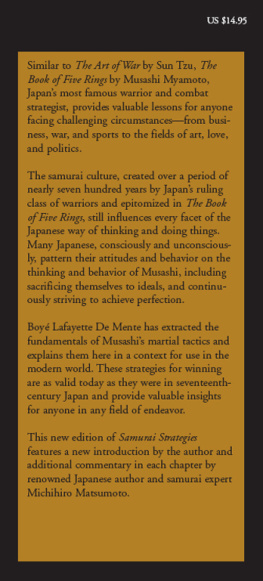A POST HILL PRESS BOOK
ISBN: 978-1-68261-525-6
ISBN (eBook): 978-1-68261-526-3
The Samurai Listener
2018 by Cash Nickerson
All Rights Reserved
Cover art by Tricia Principe, principedesign.com
No part of this book may be reproduced, stored in a retrieval system, or transmitted by any means without the written permission of the author and publisher.

Post Hill Press
New York Nashville
posthillpress.com
Published in the United States of America
CHAPTER 5
ENGAGEMENT AND GIVE AND TAKE
Are you giving and receiving? Is there a fair exchange?
The role of a training partner is an important aspect of martial arts training. In all martial arts, the student and his or her training partner take turns giving and receiving attacks. In a training exercise, you learn both by giving and receiving strikes and by being offensive and defensive. It would be unimaginable and unthinkable to have a training session where the word switch wasnt uttered. An instructor shouting the word switch is your cue to change roles. You now defend if you were the attacking training partner and you attack if you were the defending training partner. Think of it this way, since attacking may involve striking your opponent, how fair would it be if you only got hit? Likewise, what would you learn about defending yourself if you only did the striking?
Great conversations involve give and take. Great sales calls involve give and take. Great interviews involve give and take. There is nothing more annoying and unsuccessful than a salesperson who cant shut up. There is no worse interview than one in which the candidate or the interviewer does all the talking. The worst and most unproductive meetings involve someone dominating the conversation to the exclusion of others. All human advancement involving more than one person is the result of a fair, balanced, and bargained exchange of information between them.
In order to understand the concept and value of engagement and a fair, balanced, and bargained exchange of information, lets look at the opposite. What is the worst example of communication? Thats obvious: its a knock-down, drag out argumenta disagreement of major proportions. By now, you should have a framework for and understand why an argument doesnt change someones opinion, and why everyone walks away mad.
It doesnt start with an argument. Arguments often arise out of civil conversations. Reflect on a recent argument you have been a part of or witnessed. What caused it? Break it down. Did the shields go up? Receptivity ended. Engagement ensued, but there was no give and take, just give and give from one followed by give and give from the other.
You have been a part of great conversations in your life. You have danced in your life. If youre trained in the martial arts, you have experienced some great training sessions. All of these events are characterized by a rhythmic exchange. They dont feel clunkythey feel natural. You breathe and move. When this occurs, you get in the moment. And in that moment, you share, you learn, you remember, and you both advance. Its beautiful.
Fairness is one of the earliest concepts we understand as children. If you dont remember your own childhood, observe your children. If your children are older, observe their children. The phases of childhood development are fascinating to observe, especially when a toddler enjoys saying no to everything. It is an exercise of will that is part of growing up.
All of you have undoubtedly uttered the phrase, That is not fair, at some point. Fairness matters, at home, in relationships, and of course in the workplace. It is the basis of many employee issues. You did something improper in early school education, for example, and you got punished. If someone else did the same thing and got a lighter punishment your reaction was swift to declare it unfair!
The give and take of a great conversation requires fairness. If someone feels unfairly treated, you will have a very hard time getting through to him or her on any issue. They will never like or respect you as much as you want or as much as they could, or maybe should.
Interrupting someone is unfair, isnt it? When someone interrupts you the first thing you feel is that someone has broken a rule of fairness and crossed a line they are not supposed to cross. Interrupting someone is an act of selfishness. They may even apologize as they do it: I Am Sorry to Interrupt You, But...
You just dont want to hear it.
Give and take in a good conversation takes an incredible amount of patience. What happens when we become impatient? We interrupt the speakersthose who are trying to express themselves. Of all the difficulties involved in effective listening, especially between those who work together or are in a more intimate relationship, interrupting one another is the most damaging. What is the cost of dysfunctional communication? The result is suboptimal performance in a team, and emotional side effects and scars that lead to even worse performance over the long term. If the interruption happens in an intimate relationship, it can permanently impair your interactions with your partner, friend, or child.
How can you stop, or at least reduce, your tendency to interrupt others? It happens so fast. And what do interrupters (including myself) say? Im sorry, I didnt mean to interrupt. Or, I am sorry to interrupt you, but... Think about those phrases. Of course, you didnt mean to interrupt, but you did. Are you or they really sorry to interrupt? You may be sorry to have to do it, but not sorry you did it. There is a difference.
Some folks, especially those who repeatedly interrupt, do so in a way that makes it seem impulsive; almost like an involuntary act? Whether you are the perpetrator of an interruption or the victim, it happens so fast, doesnt it? Because this can become an impulsive habit, if you want to interrupt less, you have to understand the root causes of interrupting, and that interrupting someone comes at the end of a process.
To help you understand the root causes of the interrupting process, I identify and describe various types of talkers and listeners and their traits. Your ability to recognize these types will enable you to react in a more productive manner. In the exercises at the end of this chapter, youll find tips and practice exercises to help you avoid interrupting and to reduce the likelihood that you will be interrupted.
The Talkers
The Slow Talker Someone is talking and he or she just isnt going fast enough; you have to get the person talking faster. You feel the need to nudge the person along so you can catch a plane, a train, get home, get other work done, or do whatever is driving your schedule that day.
The Rambler Someone is making a pointless speech. Think John Candy in Planes, Trains and Automobiles . This is talking that seemingly has no beginning, no end, and therefore absolutely no point whatsoever. When the speech is over, nobody knows what to do or to say. When this happens in a group setting, everyone will tend to look around at one another dumbfounded.
The Repeater This is the person who seems to repeat things that have already been said. You have already heard the point being made, so who needs it? When Repeaters say something that has already been said, they could be practicing active listening to themselves. Or perhaps they are just absorbing the content for the first time. People absorb ideas at such varying rates and in very different ways. Some people think conceptually and they get it fast. Other people are engineers who need to see the bricks in place more than once. Is one listening style or speed better than the other? Of course not. Once engineers see the bricks, they tend to have a deeper understanding than the fast-moving, conceptual thinker.
Next page












